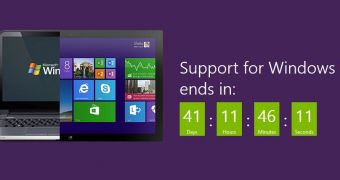Windows XP, which remains the second most popular operating system in the entire world, will be discontinued on April 8, 2014, which means that all users running this particular platform should move to a new one by this date.
According to Microsoft, which obviously wants all users to move from Windows XP to the modern Windows 8.1, the security risks of staying on an unsupported operating system are enormous, especially because many attackers out there will try to exploit found vulnerabilities and access users’ data.
China, on the other hand, is ignoring all warnings issued by Redmond and, since many users are still running Windows XP, local IT giants have already announced that extended support for this particular OS version will be offered beyond April 8, when Microsoft is going to stop providing patches and security updates.
Tencent, Kingsoft, Sogou, and other firms have already expressed their intentions to provide assistance to users still running Windows XP after April, just to make sure that their computers are on the safe side and no hack attacks are taking place.
At the same time, the Chinese government has also come up with an unexpected request, calling for the software giant to extend support for computers still used by local authorities.
At this point, Windows XP has a global market share of 29 percent, which makes it obvious that many users will still be running it when support officially comes to an end.
While Microsoft has refused to do so and warned that Windows XP support would be discontinued in April for all computers worldwide, except for those whose owners are paying for extended support, the company has also decided to keep Security Essentials up and running for the ancient operating system.
“After 12 years, support for Windows XP will end on April 8, 2014. There will be no more security updates or technical support for the Windows XP operating system. It is very important that customers and partners migrate to a modern operating system such as Windows 8.1,” Microsoft said in a public warning.
“Customers moving to a modern operating system will benefit from dramatically enhanced security, broad device choice for a mobile workforce, higher user productivity, and a lower total cost of ownership through improved management capabilities.”
The problem for Microsoft is that many users are choosing to stay on Windows XP until a new version of the operating system is released, especially because the company has switched to a rapid release cycle that’s expected to bring new Windows versions to the market on a yearly basis.

 14 DAY TRIAL //
14 DAY TRIAL //